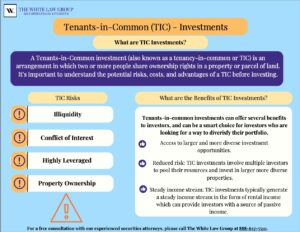What is a Tenants-in-Common (TIC) investment?
A Tenants-in-Common investment (also known as a tenancy-in-common or TIC) is an arrangement in which two or more people share ownership rights in a property or parcel of land.
It’s important to understand the potential risks, costs, and advantages of a TIC before investing. Generally offered as a 1031 exchange tax deferral, financial professionals often misrepresent the risks and benefits of these investments. Moreover, the investments –due to the attractiveness of the income offered by the investments –are often marketed to conservative and retired investors.
How does a Tenants-in- Common (TIC) Investment work?
Tenants-in-Common (TIC) refers to an investment made by the taxpayer in real estate which is co-owned with other investors. Since the taxpayer holds deed to real estate as a tenant in common, the investment qualifies under the like-kind rules of § 1031.
Essentially, the way that a TIC investment works is as follows: After acquiring a property, the TIC sponsor markets and sells interests in the property to investors (at a markup), with the sponsor then reducing its own interest in the property to a small fraction or zero as its interest are sold off to the investors. A second entity is then formed by the sponsor to enter into a lease agreement with the investors, pursuant to which the investors become the landlord of the subject property and the second entity becomes the property manager. The Lessee would then sub-lease the property to tenants and, in theory, pay the promised income to the owners.
Various broker-dealers have been used by TIC sponsors to market and sell interests in these investments to the unsuspecting public and were compensated (handsomely) by these sponsors through the form of commissions.
Delaware Statutory Trust (also known as a DST) goes hand-in-hand with Tenants-in-Common investments, with slight differences. A DST is a separate legal entity formed as a trust under the law of Delaware in which each owner has a “beneficial interest” in the DST for income tax purposes and is treated as owning an undivided fractional interest in the property. Recently, DSTs have been gaining in popularity for a number of reasons including being able to secure financing more readily and attract more investors with lower minimum investments amounts.
What is the Difference between a TIC and DST?
The main difference between Tenants-in-common and Delaware statutory trust is that a tenancy-in-common is a type of ownership where multiple people own a property together, while a Delaware Statutory Trust is a type of trust that is set up for the purpose of investing in real estate or other assets. Another difference is that a tenancy in common provides each owner with a separate share of the property, while Delaware statutory trust provides beneficiaries with an interest in the trust itself. Additionally, a tenancy in common does not provide limited liability protection to its owners, while Delaware statutory trust does provide limited liability protection to its beneficiaries.
What are the benefits of Tenants-in-Common (TIC) investments?
The primary reason someone would want to get into a TIC investment is the tax benefits, known as the 1031 exchange, they would receive. Under the Like-Kind Exchange IRC Code § 1031: “Whenever you sell business or investment property and you have a gain, you generally have to pay tax on the gain at the time of sale. IRC Section 1031 provides an exception and allows you to postpone paying tax on the gain if you reinvest the proceeds in similar property as part of a qualifying like-kind exchange. Gain deferred in a like-kind exchange under IRC Section 1031 is tax-deferred, but it is not tax-free.” Eventually you do have to pay the taxes, but a 1031 exchange allows you to delay those taxes until later down the road.
What are the risks of Tenants-in-Common Investments?
 TIC investments come with several risk factors that you should be aware of:
TIC investments come with several risk factors that you should be aware of:
- While the investor is often focused on avoiding the Capital Gains Tax, they do not think about the fact that TIC properties may be owned by up to 35 people, (and no limit with a DST). This is an inherent problem because a unanimous consent of all tenants is necessary to make decisions like selling, leasing, and refinancing.
- TIC investments are almost always illiquid. This can create a number of problems. For example, if one of the TIC owners has a life altering event occur they can’t just liquidate their interests. They have to wait until the decision to sell is made by all or the majority (depending on the TIC structure) is ready to sell.
- Your broker may be recommending a TIC for his own interests. Financial advisors should have their client’s best interest as a first priority. Unfortunately, that is not always the case as TIC investments pay unusually high sales commissions to the advisors. This may lead to a conflict of interest. The question becomes, did my advisor recommend this TIC because he/she thought it was a great investment and fit my needs or were they more interested in the 5-10 percent commission they are making on this sale?
- Most TIC investments are also highly leveraged, borrowing enormously to acquire the properties. This means that the TIC investment runs the risk of default with even the smallest of market fluctuations.
Tenants-in-Common TIC Investment Sponsors
A TIC Sponsor is an individual or entity that locates properties to buy ‘wholesale,’ then packages it, and sells it to multiple investors at a ‘retail’ price. The multiple investors hold a title as ‘Tenants in Common’. The difference between the wholesale and retail price is what the sponsor is earns for their services. Typically this is between 5-7% percent of the total value of the investment, according to TM 1031 Exchange.
The sponsors often make the investments sound too good to be true – income producing, no hassles, great properties. The sponsors usually even provide glossy marketing materials showing the properties and forecasting great prospects. Notwithstanding these representations, TIC investments remain extremely high-risk, in large part due to the enormous commissions being paid out to the sponsors, brokerage firms, and financial advisors, which can eat in to any profitability the investments may have had.
Common TIC Sponsors
There are a number of companies that sponsor TIC and DST investments, including Cornerstone Real Estate Investment Services
Kay Properties & Investments LLC, Irexa Financial Services Wealth Strategies, 1031 Exchange Properties, Capital Real Estate, as well as the following:
Madison Capital Group
MCG Charleston Apartments LLC 2020
MCG HENDERSONVILLE TIC LLC 2021
Nelson Brothers
Cottonwood Residential
Melrose II S TIC, LLC 2021
CW Investor on Highland LLC 2019
Avistone Commercial Real Estate Investing:
AVISTONE PRESIDENTS, LLC
AVISTONE TULLER, LLC
AVISTONE PLEASANTDALE, LLC
AVISTONE TAMPA FLEX S, LLC
AVISTONE CRAMER CREEK, LLC
AVISTONE GATEWAY, LLC
AVISTONE CRAMER CREEK S, LLC
AVISTONE DEARBORN, LLC
AVISTONE TULLER S, LLC
AVISTONE GATEWAY OAKS, LLC
AVISTONE WEST TECH, LLC
AVISTONE NORTHWEST, LLC
AVISTONE CITYGATE, LLC
AVISTONE NORTHWEST S, LLC
AVISTONE GATEWAY OAKS S, LLC
AVISTONE NORTHWOODS, LLC
AVISTONE NORTHGATE III, LLC
AVISTONE NORTHGATE, LLC
American Capital Group:
Addison Greens Apartment Associates LLC
Highlands at Spectrum Apartments LLC
The Dakota Apartments Associates LLC
Sterling Pointe Apartment Associates LLC
Monticello apartments Associates LLC
Cabot Investment Properties:
Cabot East Town Acquisition LLC
Cabot Ashtabula Acquisition LLC
Cabot Creekside Acquisition LLC
Cabot Golf CL-PP Acquisition LLC
Cabot Northpark Southland Acquisition LLC
Cabot Oak Grove ACQUISITION LLC
Cabot Turfway Ridge ACQUISITION LLC
Cottonwood Capital, LLC:
Cottonwood Blue Swan S LLC
Cottonwood Copperfield S LLC
Cottonwood Arbors S LLC
Cottonwood Gables S LLC
Cottonwood Oakridge S LLC
Cottonwood Regatta S LLC
Cottonwood West Town S LP
Covington Realty Partners
Covington First Colony Commons
Covington Dardenne Acquisition LLC
Covington Gateway Station Shopping Center Phase II
Covington Lansing Acquisition LLC
Desanto Realty Group
DRG Cason Estates LLC
DRG Clearview LLC
DRG Cypress Medical LLC
DRG Fox Chase LLC
DRG Hendersonville LLC
DRG Hunter’s Chase LLC
DRG Northwoods Crossing LLC
DRG Pennbrook LLC
DRG Perry’s Crossing
Direct Invest LLC:
Direct Invest- Riverbend Executive park LLC
Direct Invest- 116 Invest Highway LLC
Direct Invest -Delmar LLC
Direct Invest- Winding Brook drive LLC
Direct Invest- 246 Omini Way LLC
Direct Invest- 2810 North Parnham Road LLC
Direct Invest 500 East Main LLC
Direct Invest- Heron Cover LLC
Direct Invest -Braintree Park LLC
Gemini Real Estate Advisors, LLC
Gemini Brandon S TIC – Brandon LA Fitness Shopping Center
Gemini 442 West 36th Street S LLC TIC Comfort Inn (NYNY)
Gemini Diamond Run S LLC -TIC Diamond Run Mall
Gemini Johnstown Galleria S LLC- TIC Johnstown Galleria
Gemni Rio Norte S LLC- TIC Rio Norte Shopping Center
Gemini Rowlette Crossing S LLC – TIC Rowlette Crossing Shopping center
Gemini Tinley Park S LLC – TIC Tinley Park LA Fitness
Griffin Capital Corporation
Griffin Capital Bolingbrook Investors LLC
Griffin Capital Independence Investors LLC
Griffin Capital Palomar Investors LLC
Griffin Capital Westmont Investors LLC
Griffin Capital Redwood Investors LLC
Inland Real Estate
Charlotte 1031 LLC
Olivet Church 1031 LLC
Glenview 1031 LLC
Dublin 1031 LLC
Houston 1031 LLC
Plano 1031 LLC
Eden Prairie 1031 LLC
Waukesha 1031 LLC
Tampa Coconut Palms Office Building 1031 LLC
Geneva 1031 LLC
Memorial Square 1031 LLC
Countrywood 1031 LLC
Carmel Office 1031 LLC
Is a Tenants-in-Common investment suitable for you?
Your financial advisor should only recommend investments that are suitable for their clients. The financial advisor should conduct a suitability analysis on a holistic level. Liquidity needs, time horizon, risk tolerance, age, income, are just a few categories an advisor should take into account prior to recommending any investment. Once that is completed the brokerage firm must ensure that due diligence was completed at every level of each investment.
FINRA issued multiple notices reminding brokerage firms that they cannot recommend TIC based only on the information they received by the sponsoring company. As a matter of fact, the firm is legally required to conduct a “reasonable investigation” of their own accord to confirm there is no misrepresentation on the sponsors end. These safe guards are in place to protect the investor, but unfortunately sometimes they are overlooked.
What is FINRA Arbitration?
FINRA is responsible for overseeing the activities of brokerage firms, and for enforcing rules and regulations related to the trading of securities. Seeking restitution through FINRA arbitration can be a helpful process if you feel as though you’ve been defrauded. Once you’ve retained a securities fraud attorney, the process of filing a claim through FINRA could take place.
This claim should include a description of the fraud, the amount of money lost, and any supporting documentation. Once the claim is filed, FINRA will appoint an arbitrator to hear the case.
The arbitrator is responsible for reviewing the evidence and making a decision about whether the investor is entitled to restitution. If the arbitrator rules in favor of the investor, they will issue an award for damages, and this can be used to seek restitution from the person or company that defrauded the investor.
Filing a FINRA Claim against your Brokerage Firm
The foregoing information, which is all publicly available, is being provided by The White Law Group. If you have suffered losses as a result of a financial advisor’s misleading representations of a Tenants-in-Common (TIC) or DST investment we may be able to help. The securities attorneys of The White Law Group can file a FINRA arbitration claim to recover your losses.
For a free consultation with a securities attorney, please call 888-637-5510.
The White Law Group, LLC is a national securities fraud, securities arbitration, investor protection, and securities regulation/compliance law firm with offices in Chicago, Illinois and Seattle, Washington. For more information on the firm and its representation of investors in FINRA arbitration claims, visit https://www.whitesecuritieslaw.com.
Tags: tenants-in-common, TIC investment Last modified: March 13, 2024

